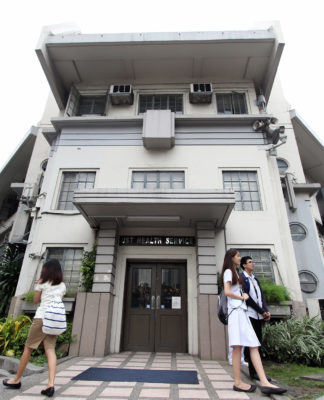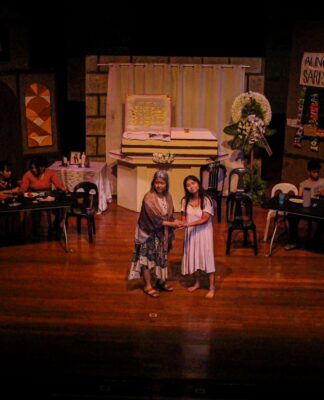WITH media’s expanding role in shaping public opinion, journalists must use their faith amid temptations and to find the “ultimate truth.”
“Bente kwatro oras ‘di natutulog ang demonyo,” warned 24 Oras television news anchor and radio broadcaster Mike Enriquez in the First National Social Communications and Media Summit held at the University of Asia and the Pacific (UA&P) last April 23.
Enriquez said self-centeredness makes it very difficult for media practitioners to remain true to their faith in a world run by ratings and revenue, referring to the industry as “commercial media.”
“It is very easy to give in, to succumb. It is much easier to forget matters of faith especially when you have fame and glory. It is very much easier to become less spiritual,” Enriquez said. “Living one’s faith is a deliberate undertaking. It is an effort.”
Many journalists even regard themselves as “God’s gifts to media” and “God’s gifts to the world,” said Enriquez, an active parishioner in Sta. Ana, Manila.
The symposium, which had the theme “Living Our Faith in the Realm of Media and Politics,” was organized by the Catholic Bishops’ Conference of the Philippines (CBCP) – Episcopal Commission on Social Communications and Mass Media, in an effort to understand the challenges facing Catholic communicators and come up with solutions.
Manila Archbishop Luis Antonio Cardinal Tagle said media practitioners should seek the truth through God, who is the “ultimate truth.”
“Reason and faith are related to one another and they do not need to fight with each other. The truth that can be found in the secular world is rooted in the truth revealed by God who is the very Creator of this world. The secular approach to truth is actually an approach to truth rooted in the truth of God,” Tagle said.
Manila Auxiliary Bishop Bernardino Cortez recognized the importance of proper context and sensitivity in Church reportage, echoing Pope Francis’ address to media last March 16.
“The Church is certainly a human and historical institution with all that that entails, yet her nature is not essentially political but spiritual. Only from this perspective can a satisfactory account be given of the Church’s life and activity,” Cortez said.
Edwin Tan, Eternal Word Television Network Asia-Pacific regional manager, said one of the challenges in living one’s faith is the “pleasure principle.”
“Mainstream media is driven by the pleasure principle—that pleasure is the best guide for human behavior. Kung saan ka masaya, suportahan taka. The Church has been communicating something contradictory all along, and that message is the language of the Cross,” he said.
Church’s freedom of expression
Ahead of the midterm polls, Maria Riza Bondal, assistant professor at the UA&P School of Education and Human Development, said the Catholic Vote Movement is not a form of bloc voting or Church interference because it is organized by the laity, not the Catholic hierarchy.
“It is a constitutional right—the freedom of expression and of association. [Lay persons are calling on] Catholics to vote as Catholics, taking into account their knowledge of doctrines and morals. The lay faithful has a role to play in the evangelizing mission of the Church,” Bondal said.
Following the passage of the Reproductive Health (RH) law and talk of legislating divorce, Catholic Vote Philippines provided general guidelines that will help the public decide whom to vote for based on the candidates’ position on issues concerning life, family, and marriage. There is no imposition on which candidates should be chosen.
“It is the duty of citizens to contribute along with the civil authorities to the good of the society in a spirit of truth, justice, solidarity, and freedom,” the Catechism of the Catholic Church on Voting reads, as cited in Catholic Vote Philippines’ official website (www.catholicvote.ph).
Bondal said Catholics should not regard Catholicism as a “jacket that they only wear when they enter Church premises.”
The Church cannot be accused of violating the constituting provision on the separation of Church and State, she said, pointing out that the principle mainly talks about religious freedom. Ironically, this constitutional protection is being used against its very purpose, she added.
“The principle of the separation of Church and State was actually meant to keep the State out of the Church’s business, not the other way around. It upholds the free exercise clause which means that anybody can exercise his religion, and the establishment clause which means that there cannot be a national religion,” Bondal said.
Bondal said the Church cannot keep quiet on what is happening in the temporal order because part of its mission is to pass moral judgment on societal affairs. “It cannot be an absolute separation because [the Church and the State] are working for the same people.”














